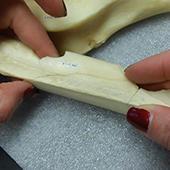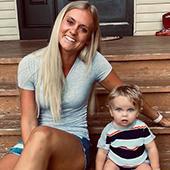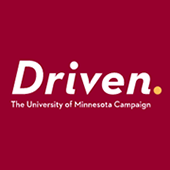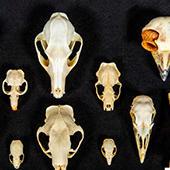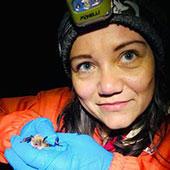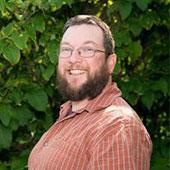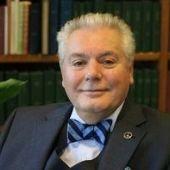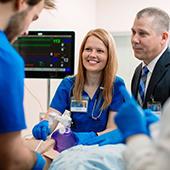- Board of Regents meets Oct. 8-9.
- Features: Piecing together puzzles from the past; A nurse, a toddler, a kidney transplant.
- People: Paul Dauenhauer and Damien Fair have been named fellows by the John D. and Catherine T. MacArthur Foundation; and more.
Oct. 8-9 - Board of Regents meeting
The Board of Regents will meet to discuss recommendations for guiding academic work and research in light of the pandemic. The Board is also expected to act on the proposed discontinuation of four Gopher Athletics programs; hear updates from leaders on each of the University’s five campuses on their strategic enrollment work; act on President Gabel’s recommended biennial budget request, recommended six-year capital plan, and 2021 state capital request; receive an update on how COVID-19 has affected the University’s finances; and more. See details in the news release.
Piecing together puzzles from the past
Most jigsaw puzzles include a picture of the finished product on the box to guide you in piecing them together. Now, imagine not having those pictures. Imagine that the puzzles are over a million years old, and the different pieces are all jumbled together. Such is the process of piecing together broken artifacts from the past. But a University of Minnesota team has come together to speed up that process.
A nurse, a toddler, a kidney transplant—and the breakthrough technology that made it all happen
In July, 27-year-old Taylor Pikkarainen donated a kidney to 1-year-old Bodie Hall after the two were paired using a new innovation called epitope mapping and eplet matching. The sophisticated technique evaluates potential donors and recipients at a detailed, molecular level to ensure that the best-possible match is made.
People
Paul Dauenhauer and Damien Fair have been named fellows by the John D. and Catherine T. MacArthur Foundation; The Center for Infectious Disease Research and Policy has been awarded a grant to increase the global impact and accessibility of antimicrobial stewardship; Polaris has donated $1 million to the U of M to support STEM education programs; the Medical School’s Center for Women in Medicine and Science received the Emerging Leadership Award for an Organization from the Association of American Medical Colleges; the National States Geographic Information Council has recognized the Mapping Prejudice Project with a Catalyst award; U in the News features highlights of U faculty and staff cited in the media. People
Brief at 50
The first issue of Brief was published on Oct. 6, 1970, making 2020 the publication’s 50th year. At that time, Malcolm Moos was the University’s 10th president (Joan Gabel is our 17th). Nationally, the Commission on Campus Unrest had concluded a special report on the tragedy at Kent State University. Around the University, it was noted in that first issue that Crookston had begun an exchange program, Duluth's enrollment increased to 5,700 students, Morris was beginning its 10th year, and "major moves were under way to relieve parking and traffic problems on the TC Campus." View the full historical archive of issues at U of M Libraries Digital Conservancy.
University decides not to implement payroll tax holiday
The University has decided not to implement the Social Security payroll tax holiday (IRS Notice 2020-65) at this time. Among other factors, the tax holiday only defers taxes; employees would still be required to pay the taxes later, starting in January 2021, resulting in large tax withholdings from paychecks next year. The University’s decision aligns with other Big 10 universities and local private industry.
New Wellbeing Program platform
The Wellbeing Program year for employees has begun, and the Office of Human Resources (OHR) has debuted the all-new online platform for the program, complete with new activity and customization options and a convenient app. Even if you’ve participated in the Wellbeing Program before, you’ll need to enroll on the new platform. Learn more on OHR’s guide.
Comment period open for proposed rule on international student ‘duration of status’
U.S. Immigration and Customs Enforcement (ICE) has released for public comment a proposed rule that would shorten the time international students are permitted to remain in the United States and force them to renew their status more often. This change would likely negatively affect international students who have planned to pursue study in the U.S. President Gabel has submitted a letter on behalf of the University of Minnesota asking that the proposal be retracted. There is a 30-day public comment period (ending Oct. 25) for individuals to provide feedback on the proposed rule.
University of Minnesota launches the 'Immigrants in COVID America' project
The U of M has launched the Immigrants in COVID America project, a timely resource and website that documents the health, economic, and social impact of COVID-19 on immigrant and refugee communities in the United States. Researchers on the project found four issues that have particularly affected immigrants, refugees, and asylees during the pandemic: immigration policy, health, labor and the economy, and anti-Asian xenophobia.
4-H through the generations
When Nancy Hegland was growing up, Minnesota 4-H was an important part of her life—and today, her three children participate. “It’s an organization that has brought me joy in my profession for 30 years,” says Hegland, youth development program leader at University of Minnesota Extension and a member of the systemwide Faculty Staff Campaign Advisory Committee. She and her husband give to several areas within 4-H, including youth leadership. Watch a short video featuring Hegland.
U of M develops AI algorithm to analyze chest X-rays for COVID-19
U of M researchers have developed and validated an artificial intelligence algorithm that can evaluate chest X-rays to diagnose possible cases of COVID-19. Working together with M Health Fairview and Epic, the algorithm will be available at no cost to other health systems through Epic, the medical records software used by many health care organizations across the country. The process may help patients get treated sooner and prevent unintentional exposure to COVID-19 for staff and other patients.
Health disparities study tests mobile app’s effectiveness in treating alcohol use disorder
A cell phone app may soon become an effective way to treat alcohol use disorder (AUD) and possibly other chronic conditions, thanks to a pilot study underway at the University of Minnesota Medical School. Researchers teamed up with SupDoc, a virtual healthcare app, to answer a question.
Applications open: Imagine Fund awards
Imagine Fund awards support projects in the arts, humanities, and design. The three Imagine Fund grant programs support innovative lines of research or scholarship that may not otherwise be possible. For the current award cycle, proposals are encouraged that center, imagine, and re-imagine racial justice and social justice within the arts, humanities, and design. Special events applications are due Nov. 30; annual faculty applications are due Jan. 19; chair applications are due Feb. 15.
MnDRIVE Environment Grants due Oct. 26
The MnDRIVE Environment Seed Grant and Demonstration Grant applications are now open. The seed grant aims to fund lab/pilot scale research that uses chemical and/or biological remediation strategies to address environmental challenges across Minnesota. The demonstration grant seeks proposals within the same research scope, but which scale up remediation solutions that can be implemented by industry, state agencies, and other partners.
Research Brief: New method developed to help scientists understand how the brain processes color
University of Minnesota researchers have developed a method that allows scientists to understand how a fruit fly's brain responds to seeing color. Prior to this, being able to determine how a brain responds to color was limited to humans and animals with slower visual systems. A fruit fly, when compared to a human, has a visual system that is five times faster. Additional recent Research Briefs include “Female primary care physicians spending more time with patients may contribute to gender pay gap.”
U of M featured virtual events
Oct. 7 - Travel in the Time of COVID
Oct. 8 - Curiosity Drives Progress Lecture Series: Impacting Communities
Oct. 10 - University Symphony Orchestra and University Wind Ensemble
Oct. 15 - Kerlan Award Ceremony honoring Jon Scieszka
Oct. 15, Nov. 9, Dec. 10 - Cooking for Wellbeing: Interactive Cooking Classes
Oct. 19 - Silha Lecture: Inconvenient Truths and Tiger Kings: The Vital Role of Documentaries Today
Oct. 19 - Black Women in Sport: Voices of Resistance & Athlete Activism
Oct. 21-Nov. 1 - Spooky Science: Halloween at the Bell Museum
Supply chain series video: Meat supply chains
The meat supply chain was affected by COVID-19. Demand spiked as people rushed grocery stores while processing capacity was suspended in many locations due to disease outbreaks. This imbalance led to hikes in prices and shortages throughout the country. In this video, meat producers and processors explain how they weathered the pandemic and innovated through challenges.
Expanding our knowledge of bats
Miranda Galey, a UMD graduate student and Natural Resources Research Institute researcher, wanted to learn more about the insects that bats eat, so she studied bat guano. After the U of M Genomics Center performed gene sequencing on her samples, Galey identified the insects by cross referencing the sequences using the Barcode of Life Database. “Overall, the bats I studied ate 535 different species of insects, including some non-flying arthropods like spiders,” Galey says.
Jumping worms
Boulder Lake Environmental Learning Center (BLELC) is a partner in a research effort to track an invasive earthworm. The “jumping worm” earned its name because it squirms violently when disturbed. The public is encouraged to become “Worm Rangers.” BLELC Director Ryan Hueffmeier notes that citizen science is important to this project because “it takes the sum of many participants’ efforts to contribute to a larger scientific understanding.”
Anti-racism dialogues
U of M Morris has begun a yearlong Anti-Racism Dialogue Series. This series will help the campus work to meet this historical moment of social change regarding racial injustices, identities, power, and privilege. The campus will work with Antiracism Study Dialogue Circles Metamorphosis on the conversations and workshops for students, faculty, and staff.
Bina discusses economic turmoil in Iran
Distinguished Research Professor of Economics and Management Cyrus Bina discusses the effect of the currency crisis and economic turmoil in the Iranian economy in “Iran in turmoil as rial goes to free fall," Asia Times. Bina’s expertise includes economic theory and methodology, energy and environmental economics, political economy, globalization and strategy, Iran's economy and polity, and international relations and U.S. foreign policy.
Dabbs presents at UMD
Associate Professor of Art History Julia Dabbs recently presented "Black Subjectivity in the Life and Art of May Alcott Nieriker" as part of UMD’s Visual Culture Lecture Series. A 2020 Morse award winner, Dabbs is an expert on female artists of the early modern period and also has published on Nieriker, a 19th-century American artist.
New issue of Profile
The latest issue of Profile, a biannual magazine for alumni, friends, and parents of the University of Minnesota Morris, is available now. This issue includes a nod to the campus’s 60th anniversary, a conversation with Assistant Professor of Education Sara Lam ’03 on the topic of social justice, and a look at the campus COVID-19 response.
Early Assurance Respiratory Care program announcement
UMR has announced an expanded collaboration with Mayo Clinic School of Health Sciences for students interested in pursuing a career as a respiratory therapist. UMR now offers an Early Assurance Respiratory Care program, where students complete all four years of their collegiate experience at UMR with their final two years of coursework at Mayo Clinic, completing upper level coursework, labs, and clinical hours. "As a respiratory care student, you're guaranteed a high-quality and exciting education that's tailored specifically for challenges you'll experience when you join the workforce," says Respiratory Care Program Director Vanessa King.
Resilience, wellbeing and mental health
UMR's innovative degree programs and integrated curriculum provide students with a foundational undergraduate education. Discover how Mason, a graduate of UMR's inaugural HealthCORE Living Learning Community, navigated her time at UMR and learn more about the Resilience, Well-being and Mental Health Pathway at r.umn.edu/pathways.
2020 Community Fund Drive: Together, Making a Difference
Each year, faculty and staff on the Twin Cities campus come together to help others through the Community Fund Drive, the University’s charitable giving campaign. Faculty and staff can choose to donate to a federation or charity using payroll deduction or by making a one-time gift. You can also give to your favorite cause at the University of Minnesota. Together, we can make a difference in our community. Pledge today at cfd.umn.edu. The campaign runs through Oct. 31.
Mapping tick-borne disease risk in Wisconsin
Lyme disease is easily the best-known type of tick-borne infection, but there are others that make people sick as well. A new study from the School of Public Health analyzed the cases of three other serious—but lesser-known—tick-borne diseases in Wisconsin and found that they are increasing, moving, and varying over time.
Career Center launches Civic Scholars Initiative
Minnesota Law’s Career Center has announced the creation of a new Civic Scholars Initiative designed to encourage law student engagement in elections and other civic activities and to highlight the importance of civic engagement in any legal career. Starting in fall 2020, students will be able to attend educational workshops and participate in volunteer activities related to voting, volunteering, and learning about the election process. Students who participate will be eligible for a Civic Scholar notation on their transcript.
Resource guides for childcare professionals
The Center for Early Education and Development has compiled 10 resource guides, created for the Minnesota Department of Education, covering topics of interest for people who work with infants and young children. They include subjects like reopening childcare during the COVID-19 pandemic, challenging behaviors, and toxic stress.
Gophers from around the globe on how they stay active
Have you ever wondered how staying active varies in different communities? International student Minh Dang was surprised at the number of people playing competitive and professional sports in the United States when she first moved to Minnesota for college. Here, she shares what sports and exercising are like around the world, through the experiences of several international students.
Arboretum fall color report
The Minnesota Landscape Arboretum's director of operations, Alan Branhagen, shares weekly observations on fall color at the Arboretum. Learn about how changes in weather trigger fall colors, and enjoy beautiful pictures highlighting autumn at the Arboretum.
Oct. 29 - Women Leading Under Pressure: With No Road Map, What is Your Compass?
Hear how some of Minnesota’s most powerful female leaders make decisions under pressure while navigating their community's physical, mental, and spiritual health and their own wellness at the University's Urban Research and Outreach-Engagement Center's fall Critical Conversation. Panelists include U of M President Joan Gabel; Alika Galloway, Liberty Community Church co-pastor; Shauen Pearce, economic development and inclusion policy director with the City of Minneapolis mayor’s office; and Stella Whitney-West, NorthPoint Health and Wellness chief executive officer. 4 p.m., online.
